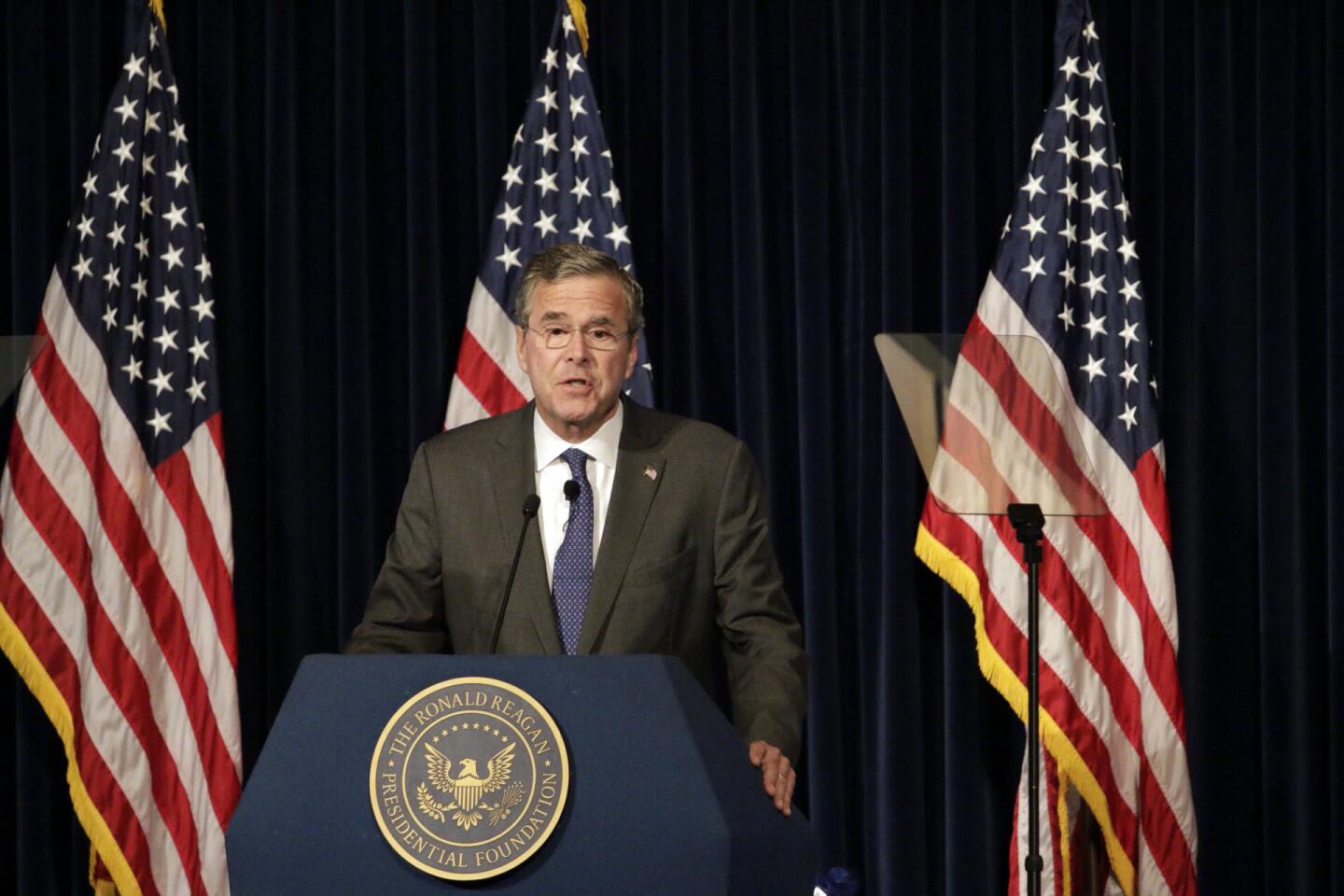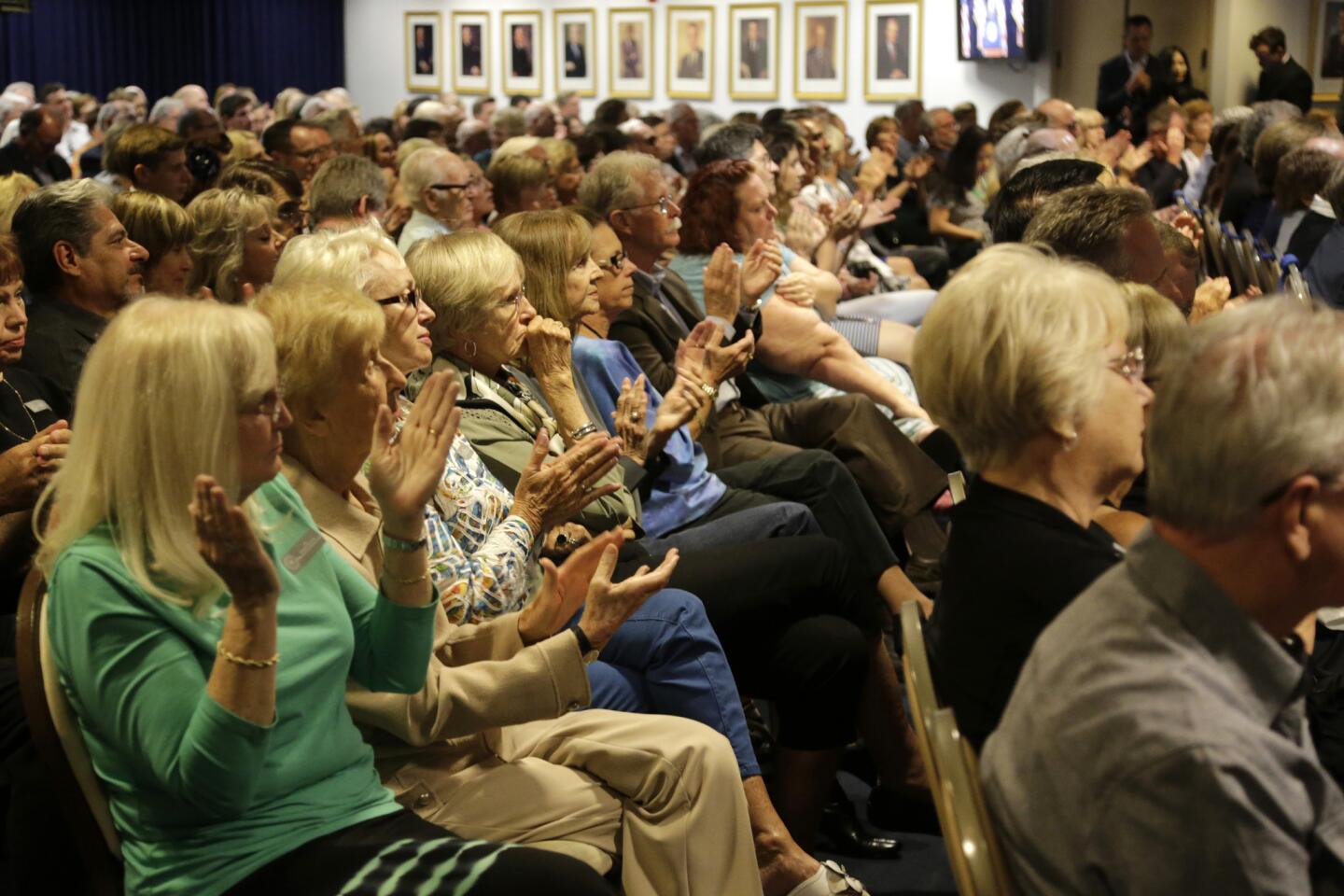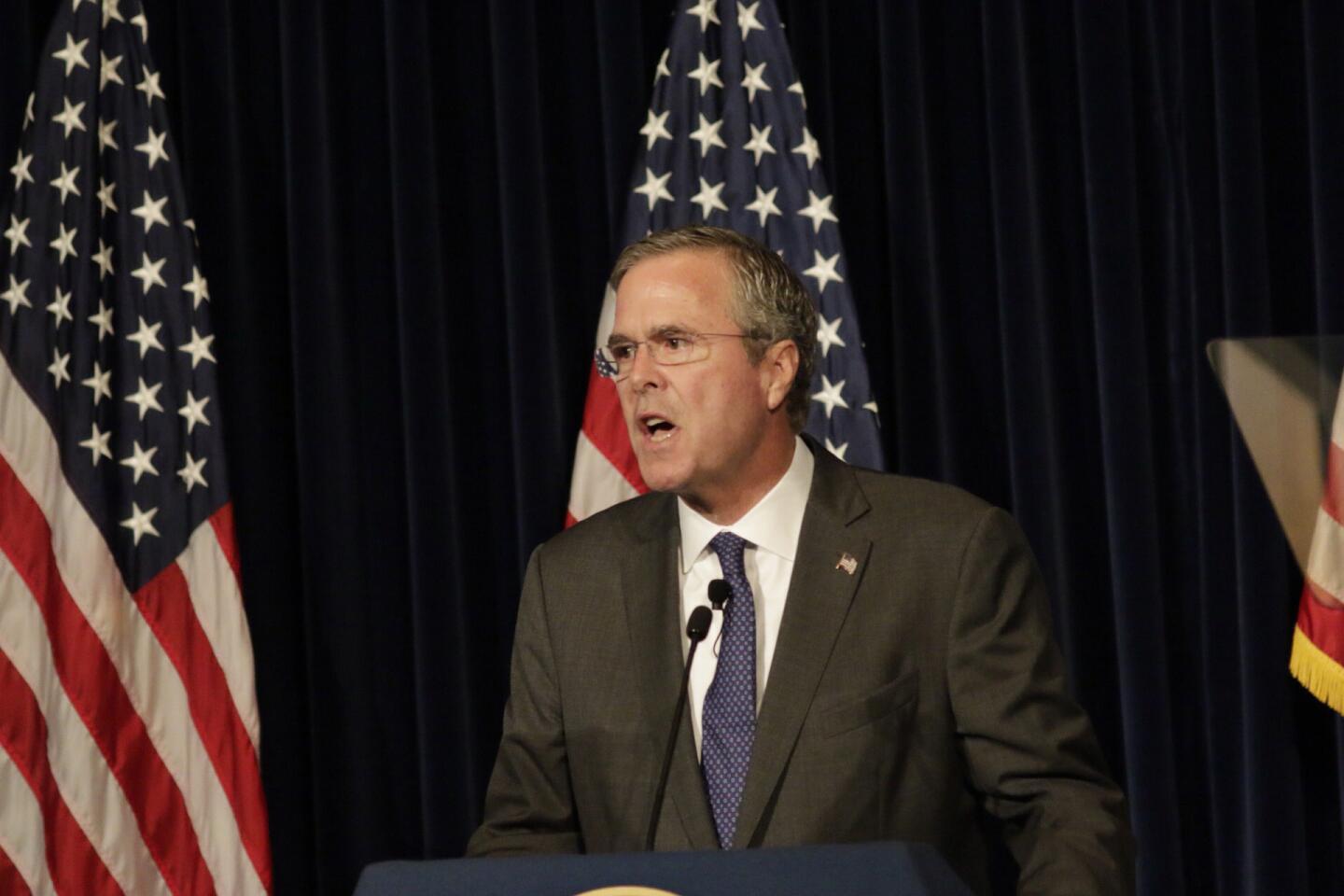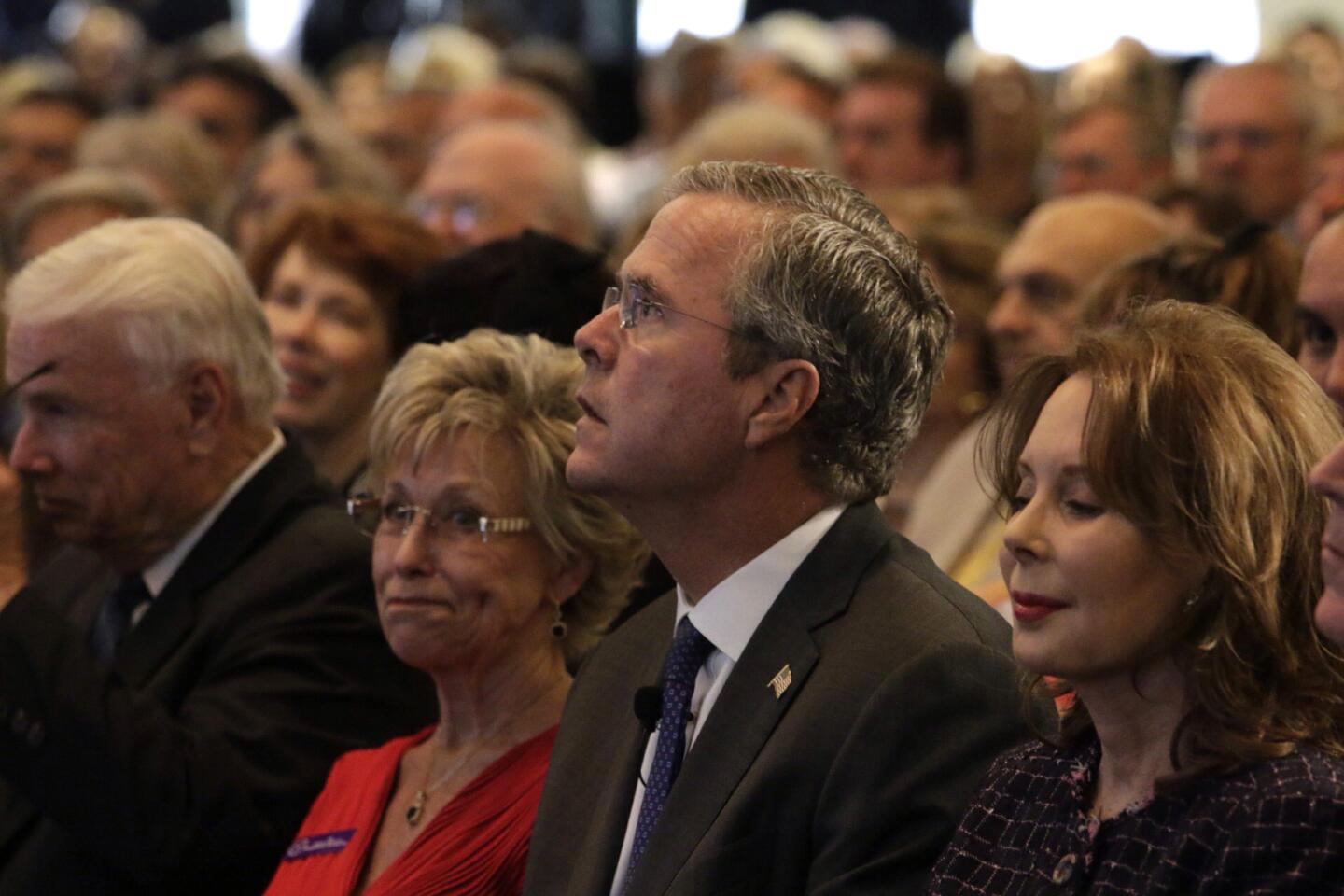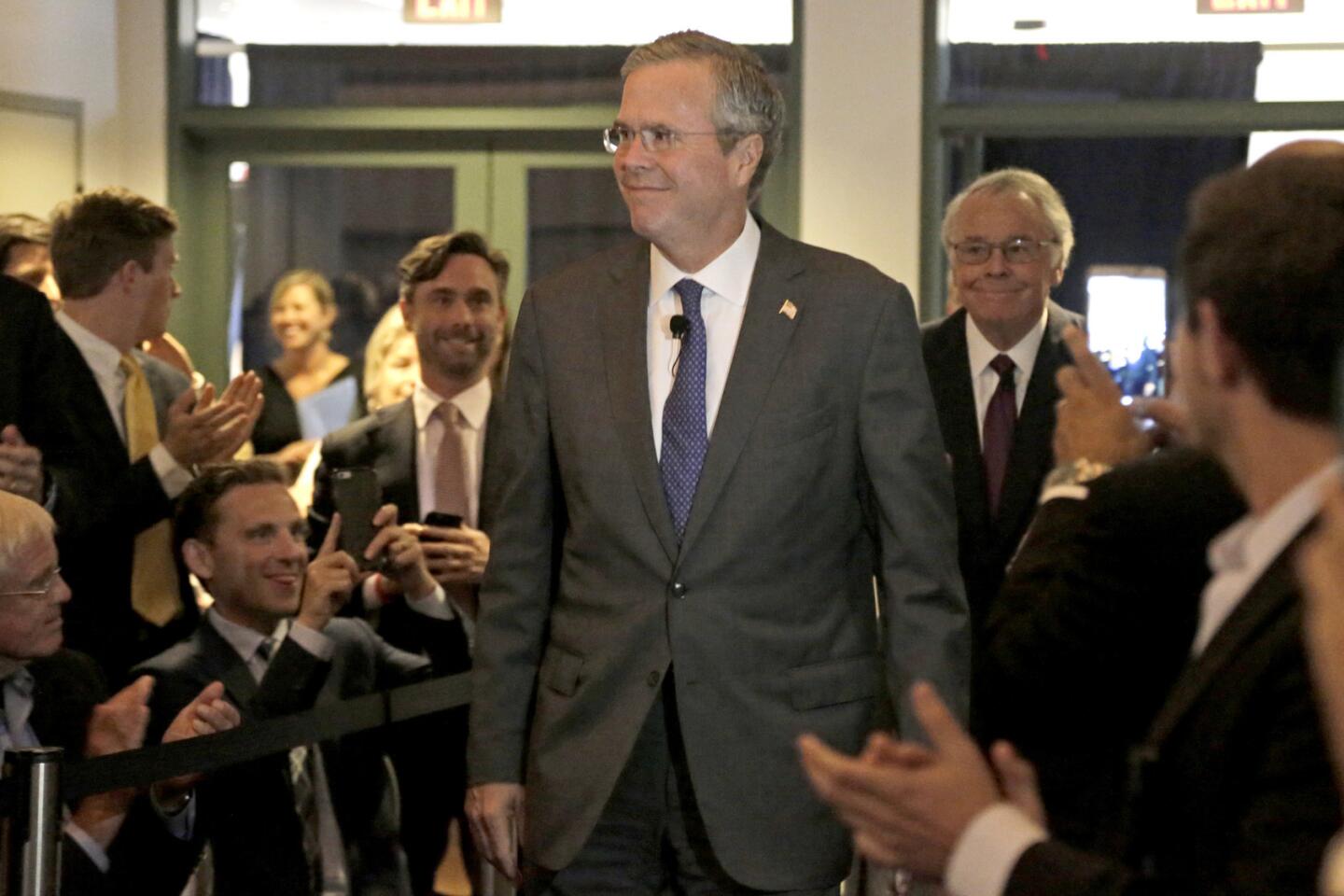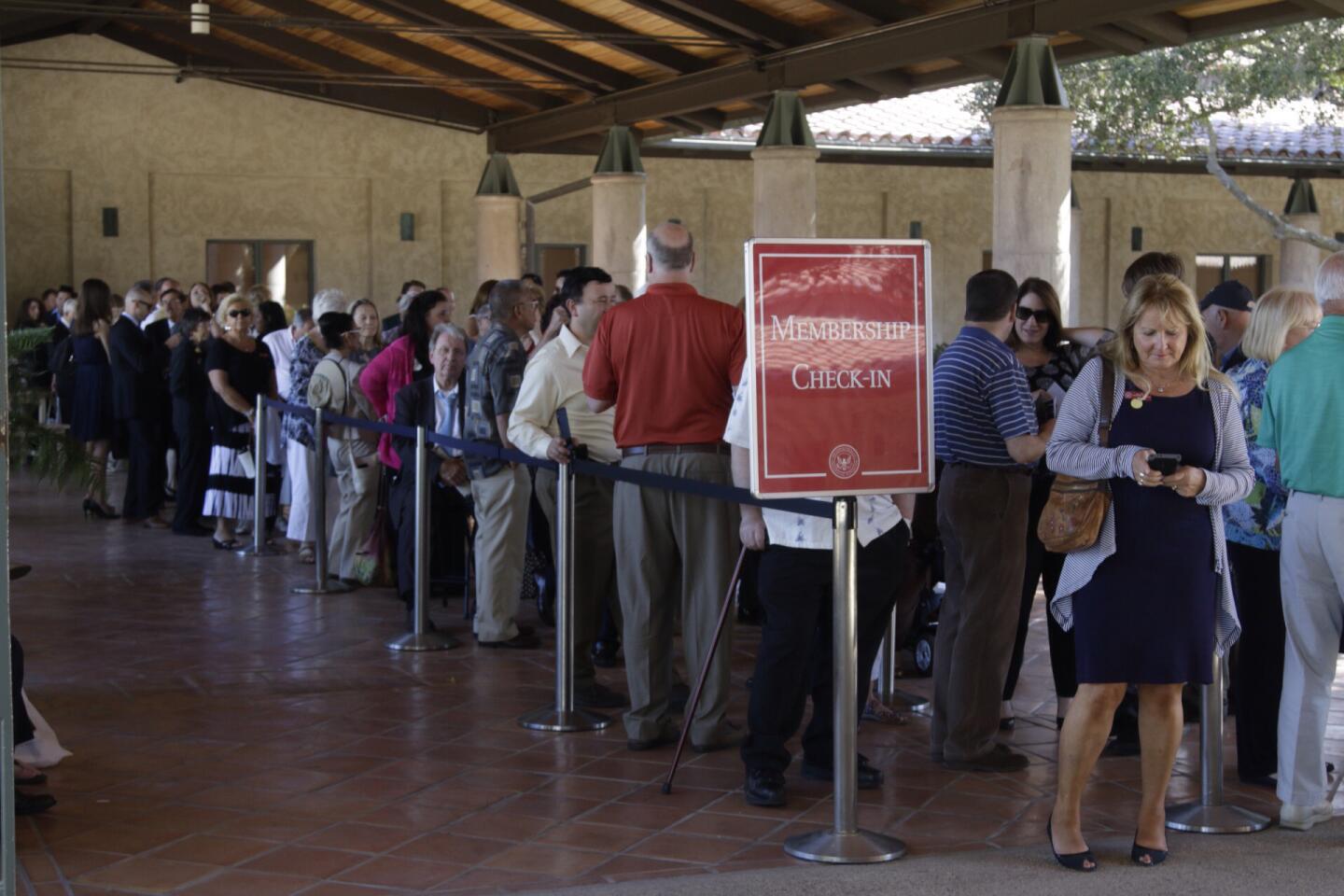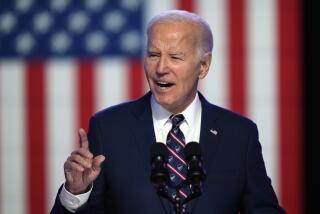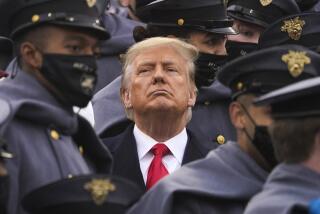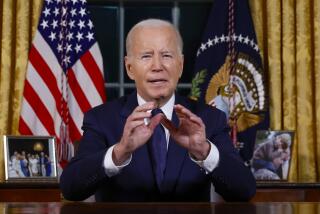Jeb Bush says Hillary Clinton played crucial role in Iraq’s decline
- Share via
This spring, Republican presidential hopeful Jeb Bush had difficulty answering a question about how he viewed the invasion of Iraq that defined — and ultimately consumed — his brother’s presidency.
On Tuesday, however, Bush plunged directly into the war’s political wake.
In what his campaign billed as a major speech at the Ronald Reagan Presidential Library, Bush highlighted the continued instability in Iraq and its neighbor, Syria, as a central focus of his foreign policy. He vowed to use military force more aggressively than President Obama has done and blamed the administration — and its former secretary of State, Hillary Rodham Clinton — for the rise of the Islamic State militant group, also known as ISIS.
“It is not true, and was wishful thinking by the administration to claim, that ‘the tide of war is receding,’” Bush said.
“Radical Islam has been spreading like a pandemic,” he said, vowing to be “resolute … in the defeat of radical Islamic terrorism wherever it appears.”
Bush called for a no-fly zone over parts of Syria, expanded safe zones for the persecuted within Syria, and embedding some U.S. ground forces with Iraqi units — all significant steps the administration has opposed. He said that while a “major commitment of American ground forces” was not necessary, the nation may need to expand the number of soldiers and Marines in Iraq. He also called for providing Iraqi forces with American air support.
In proposing more aggressive American involvement in the region, Bush addressed the concerns of many Republican voters who have told pollsters and interviewers that they see Obama as weak and believe foreign policy — and specifically the threat of militant Islam — is a key issue for the next election.
But the approach, particularly the emphasis on the military, carries considerable risk for Bush, heir to a name that is closely connected in the minds of many voters with a deeply unpopular war. After Bush’s campaign had released excerpts ahead of the speech, Clinton’s campaign went on the attack Tuesday morning, suggesting that Bush’s policies would once again lead to U.S. combat forces on the ground in a Mideast war.
On Tuesday night, before a crowd of 1,000 in Simi Valley, Bush said Obama and Clinton’s foreign policy was “based on grandiose talk and little action.” Clinton’s record — including a failed attempt to reset relations with Russia and the death of four Americans in attacks on U.S. compounds in Benghazi, Libya — is one of failure, he said.
Bush spent the bulk of his 30-minute speech laying out an account of the Iraq war’s aftermath in which Islamic State grew because of what he called Obama’s hasty troop withdrawal from Iraq and overall American abandonment of the region.
“That premature withdrawal was the fatal error, creating the void that ISIS moved in to fill — and that Iran has exploited to the full as well,” Bush said.
“And where was … Secretary of State Clinton in all of this?” he asked.
“In all of her record-setting travels, she stopped by Iraq exactly once,” said Bush, 62, the former governor of Florida. “Who can seriously argue that America and our friends are safer today than in 2009, when the president and Secretary Clinton — the storied ‘team of rivals’ — took office?”
Clinton’s campaign accused him of trying to “rewrite history” in his effort to blame the rise of Islamic State on the Obama administration. Republicans “cannot be allowed to escape responsibility” for the problems caused by former President George W. Bush’s invasion of Iraq, said Jake Sullivan, the campaign’s senior policy advisor, to reporters on a conference call.
Islamic State “emerged in no small part as a result of President Bush’s failed strategy,” said Sullivan, who served as a top aide to Clinton when she was secretary of State. He pointed to the Bush administration’s decision in the early days of the U.S. occupation to disband the Iraqi army, which left many military personnel, mostly Sunnis, unemployed, embittered and armed.
“It’s curious that Gov. Bush is choosing Iraq as the place he wants to engage the foreign policy debate,” Sullivan said.
In June, Jeb Bush ventured on a five-day European tour in which he called for the restoration of America’s leadership in world affairs and argued that the Obama administration’s approach had emboldened enemies and weakened allies. It’s a theme Bush highlighted during his speech.
“The threat of global jihad, and of the Islamic State in particular, requires all the strength, unity and confidence that only American leadership can provide,” Bush said Tuesday night.
He focused on the war’s end, which occurred under Obama, rather than on the war’s beginning.
“So why was the success of the surge followed by a withdrawal from Iraq, leaving not even the residual force that commanders and the joint chiefs knew was necessary? … Like the president himself, [Clinton] had opposed the surge, then joined in claiming credit for its success, then stood by as that hard-won victory by American and allied forces was thrown away,” Bush said.
Bush’s jibe that Clinton had only traveled to Iraq once during her tenure at the State Department poses a more difficult problem for the former secretary of State’s campaign. During Obama’s first term, it was Vice President Joe Biden, not Clinton, who played the lead role in executing U.S. policy toward Iraq.
“The key issue is not how many times the plane touches down at the airport,” Sullivan said; it’s “how effective” an official is. Clinton, he said, had played an important role in Iraq’s transition from U.S. occupation to civilian rule.
Bush did not call for significantly increasing the number of ground troops in Iraq, which some of his GOP rivals, most notably Sen. Lindsey Graham of South Carolina, have called for.
Polls show that a significant majority of Republican voters support the idea of U.S. troops returning to the Mideast. The concept is very unpopular among Democrats.
In a poll last month, for example, the nonpartisan Pew Research Center found that self-identified Republicans by a 2-1 margin supported sending “U.S. ground troops to fight” Islamic State. Democrats opposed the idea by the same margin. Independents were closely divided.
Times staff writer Mehta reported from Simi Valley and Lauter from Washington.
MORE ON 2016 CAMPAIGN:
Hillary Clinton: ‘All bets are off’ if Congress rejects Iran nuclear deal
Trump sticks by his explanation of comment about Megyn Kelly
Marco Rubio takes tough stand against abortion, with no exceptions for rape or incest
More to Read
Get the L.A. Times Politics newsletter
Deeply reported insights into legislation, politics and policy from Sacramento, Washington and beyond. In your inbox twice per week.
You may occasionally receive promotional content from the Los Angeles Times.
